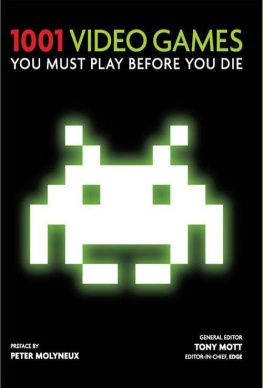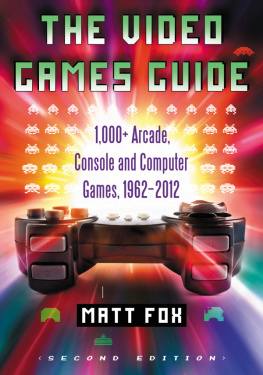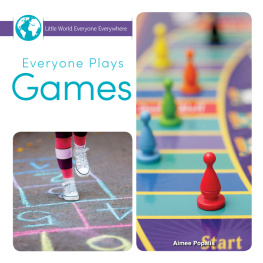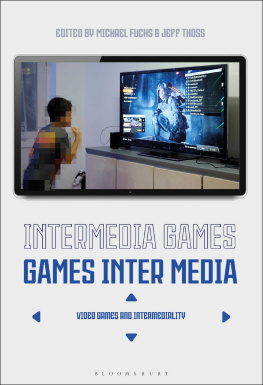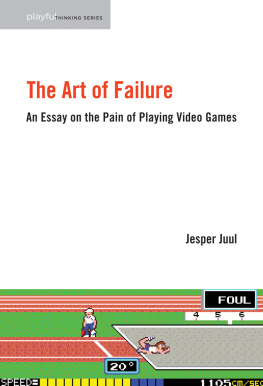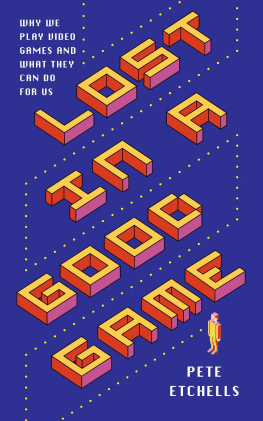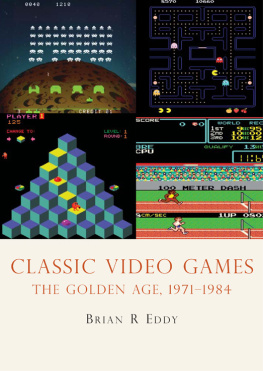1001 VIDEO GAMES
YOU MUST PLAY BEFORE YOU DIE
GENERAL EDITOR TONY MOTT
PREFACE BY PETER MOLYNEUX

A Quint essence Book
First published in the UK in 2010 by Cassell Illustrated
a division of Octopus Publishing Group Ltd
Endeavour House
189 Shaftesbury Avenue
London, WC2H 8JY
www.octopusbooks.co.uk
An Hachette UK Company
www.hachette.co.uk
This eBook first published in 2011
by Octopus Publishing Group Ltd
Copyright 2010 Quint essence
All rights reserved. No part of this publication may be reproduced, stored in a retrieval system or transmitted in any form or by any means, electronic, mechanical, photocopying, recording or otherwise, without the permission of the copyright holder.
ISBN: 978-1-84403-681-3
QSS.VIDG
This book was designed and produced by
Quint essence
230 City Road
London EC1V 2TT
www.1001beforeyoudie.com
Project Editor
Helena Baser
Editors
Frank Ritter, Simon Ward, Terry Burrows, Tamsin Oxford
Production Manager
Anna Pauletti
Editorial Director
Jane Laing
Publisher
Tristan de Lancey
CONTENTS
PREFACE
By Peter Molyneux, games developer
When I was invited to contribute the foreword to this book I didnt hesitate in saying yes, not only because its the work of some of the brightest talents in the field of game writing, but because its a celebration of what I believe is the worlds most engaging form of entertainment. Video games have been my favorite way to pass time since I first saw a dedicated Pong console among the toasters and TVs in an electrical retailer way back in the 1970s. Pong, made by Atari, is a simple game involving batting a square-shaped ball back and forth to the accompaniment of bleepy sound effects, but I was bewitched immediately, and knew that I had to have one of my own. So I got the console home, plugged it into a portable black-and-white television and within half an hour became consumed by boredom. Ten minutes later I took the machine apart in order to see how it worked. It never worked again, of course.
But I remained just as interested in playing games as I was in trying to decipher them. As the 1970s rolled around to the 1980s, video games had become a worldwide phenomenon. I began visiting pubs, not to drink beer but to play the arcade games you would always find there, nestled in corners. My visits to local cinemas were no longer about sitting down and watching the latest blockbuster movies but playing the arcade machines that lined the foyers. And of course I spent a lot of time in arcades, too. Nowadays most arcadeswhere they exist at allhave reputations for being seedy and anachronistic, but during their heyday they felt like magical places. Space Invaders. Asteroids. Defender. The incredible games during the early days kept on coming, and I played for hours at a time in these darkened spaces illuminated by alien spacecraft fizzing around cathode-ray tubes. I wasnt good at any sport, and I had no interest in academic work, but here was something at which I could excel, registering my initials on hi-score tables with every session. Video games had become my life. I decided that I wanted to make my own.
My first computer, in 1980, was a primitively powered Acorn Atom, but I couldnt wait to set about writing my first program: a routine that would make a dot move across the screen. Task complete, I ran the code and there it was on the television: a moving pixel. In that moment the world around me seemed to become brighter, as if somehow God had descended from heaven. It was like listening to The Beatles for the first time; I wanted to share it with everyone. Television joined cinema as an activity that no longer held any interest for me as I launched myself into the world of making video games. I bought piles of magazines containing typein game listings that either didnt work or failed to deliver on the promise of the far-fetched illustrations that surrounded them on the page. At first I was disappointed, and then inspired to work harder on my own creations. That was 30 years ago. My passion for creating video games hasnt diminished sinceand nor has my appetite for playing them.
When I was presented with this list of 1001 games I was pleased to see among them many of my personal favorites from across the years. Games like Ultima, Dungeon Master, Dune II, Command & Conquer, Super Mario 64, Tomb Raider, Ico, Eternal Darkness, Metal Gear Solid, Half-Life, The Legend Of Zelda: Ocarina Of Time, Halo and Uncharted 2. Age hasnt been kind to some of the older entries within these pages, but even the clunkiest-looking examples contain themes or ideas that have been important within the context of gamings evolution, and to anyone with a serious interest in the medium, the list as a whole provides a fascinating illustration of the progress made since its formative years during the 1970s.
You can look at this book as a catalog of games you must play before you die, but you can also look at it as an illustration of social and cultural change in our world. There was a world before games, and a very different world afterward. In making unbelievably sophisticated technology understandableand interactivewithin seconds, the change they have brought about has been immense. Video games do a better job than any other electronic medium in making technology accessible (compare the user experience with grappling with a spreadsheet or word processor, for example), and their influence today can be found everywhere.
Video games will continue to change the world. Right now were living in a particularly transformative age and undergoing more significant evolution than at any other time in gaming history. Consider the impact of social games via Facebook, the empowerment of players via user-generated content, the opportunities available to independent gamemakers, and the incredible diversity of options providing for downloadable content (once upon a time, getting hold of new games involved long waits between releases and then a trip to the store; nowadays, you can get new content piped into your home every day). Nintendo did a great deal to broaden gamings appeal with its DS and Wii consoles, and more recently Microsoft and Sony have moved further toward shaking things up, too. Microsofts Natal, in particular, by removing the traditional controller from the equation, represents an enormous step forward for gaming. As a consequence, it makes us designers really sweatbut its an immensely rewarding challenge.
The world has changed by a degree I couldnt have imagined when I first returned home with my Pong console, to the point that nowadays, no matter where you are in the world, no matter what your age or gender, you cannot say that video games arent for you. There are certainly plenty of examples for everyone within the 1001 collected here. Hopefully youll be as inspired by them as I have been throughout my gaming life.

Guildford, United Kingdom
INTRODUCTION
By Tony Mott
When I mentioned to a friend that I was working on this book, his immediate response was: You really think there are 1001 video games worth playing? I couldnt help but feel put out by his reaction. Of course there are 1001 video games worth playing. There are many more than that, in fact, but 2177 obviously doesnt have 1001s trim symmetry. (Also, 1001 is six fewer syllables to pronounce in a book store.) I dont imagine that the editors of 1001 Books or 1001 Movies faced such cynicism, but of course the sort of preconceptions that tend to linger around video games do not afflict most other forms of media. Compared to television, literature or music, the lowly video game isnt very widely understood.

